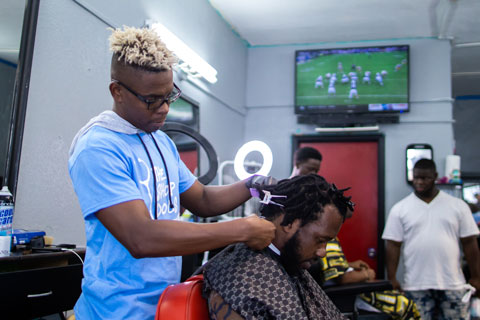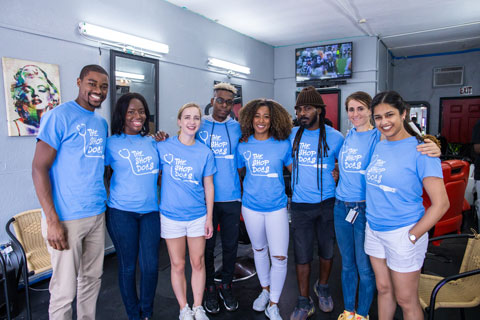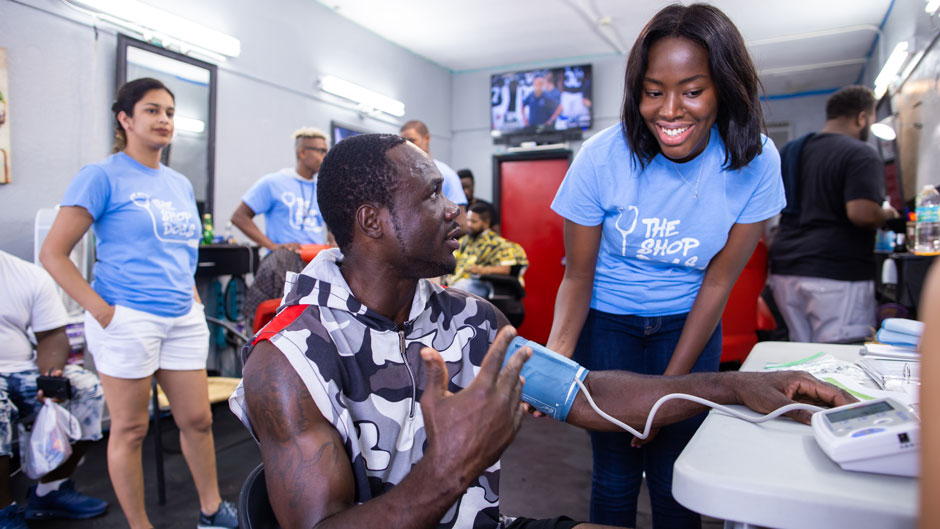Like many African-American men, Rodney Jenkins knew hypertension could be a serious health problem. But he didn’t know his own blood pressure until he walked into a neighborhood barbershop on a Saturday afternoon where a team of University of Miami students was conducting free screenings.
“I was a little nervous, but I was glad to see that my pressure was okay,” said Jenkins, a 34-year-old who learned about the importance of a low-sodium diet in managing hypertension before getting his hair trimmed at Urgent Cuts, a barbershop on NW 17th Street in Miami.
Another patron, Azea Augustama, also got good news from the screening. “I hadn’t been to a doctor for some time because I didn’t have insurance,” he said. “It was great to get my blood pressure checked right here.”
Annette Grotheer, a fourth-year student in the University of Miami Miller School of Medicine’s M.D./M.P.H. program, organized the screening through The Shop Docs, an outreach initiative she launched three years ago.
“We want to make health care more accessible to African-American men, and the barbershop is the perfect place,” she said. “We have a captive audience, so our volunteer nursing and medical students have time to build trust, answer their questions, and educate them on a healthy lifestyle. We also bring a physician who can provide other resources for improving their health.”
When Dr. Lamere Buchanan, family medicine resident, heard about Shop Docs, he couldn’t wait to take part in the screenings. “As a black male in medicine, I felt I could be a role model while educating the shop’s patrons on how to prevent medical complications from high blood pressure like heart attacks, strokes, and kidney disease.”
 People of African-American descent have been shown in epidemiologic studies to have a higher prevalence of high blood pressure than people of other racial and ethnic groups, according to Alberto J. Caban-Martinez, assistant professor of public health sciences in the Division of Environment and Public Health. High blood pressure is often more severe in blacks, and some medications are less effective in treating high blood pressure in blacks, he added.
People of African-American descent have been shown in epidemiologic studies to have a higher prevalence of high blood pressure than people of other racial and ethnic groups, according to Alberto J. Caban-Martinez, assistant professor of public health sciences in the Division of Environment and Public Health. High blood pressure is often more severe in blacks, and some medications are less effective in treating high blood pressure in blacks, he added.
“Community outreach models like Shop Docs provide education, awareness and resources to vulnerable populations that might not otherwise visit the doctor,” he said. “Our integrated M.D./M.P.H. program is designed to train the next generation of public health physicians – doctors who have a keen eye for community health, particularly for minority racial and ethnic communities.”
Caban-Martinez said Grotheer has done an “outstanding job” in conceptualizing how to bring this screening program to residents in Miami-Dade County. “She is pursuing two degrees at the same time, is a student leader on campus, and goes the extra mile by engaging other health professionals at UM and within the community to make it sustainable,” he said.
Grotheer has been working with Urgent Cuts’ co-owners Brian Nereus and Nixon Joseph for two years, building that healthy connection. “We enjoy offering the blood pressure screening service to our clients,” said Nereus. “They appreciate the fact that they can get screenings right in our neighborhood. I never had my pressure checked until Annette came here. Fortunately, mine was normal.”
But on her first visit to the shop, Grotheer said she screened a 26-year-old man whose blood pressure was dangerously high. “He told me his father had a stroke, and his mother and uncle also have hypertension. If we hadn’t been there to encourage him to see a physician, he might also have had a stroke or another serious medical problem.”
 Outreach initiatives to barbershops are catching on throughout the country, and the Shop Docs program was featured in a recent article in The National Health, a leading public health magazine. One of the lessons Grotheer cited in that article was the importance of maintaining a consistent presence at the shops to help overcome distrust of the health care system.
Outreach initiatives to barbershops are catching on throughout the country, and the Shop Docs program was featured in a recent article in The National Health, a leading public health magazine. One of the lessons Grotheer cited in that article was the importance of maintaining a consistent presence at the shops to help overcome distrust of the health care system.
Looking ahead, Grotheer plans to keep growing the Shop Docs initiative, adding new screening services and barbershop locations both locally and across the country.
“We have three new sites opening this fall, and other medical schools have reached out to us, asking about expanding their own programs,” she said. “We would also like to bring in pharmacists and hold mini clinics in barbershops. In any case, I think we might see explosive growth of this concept across the country in the next few years.”

